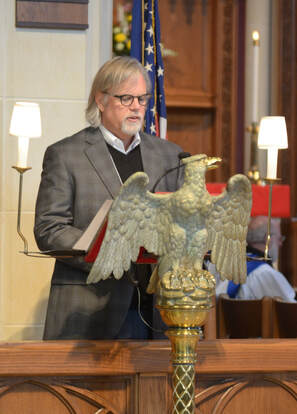February 2021 Course Descriptions

February Overview
- The Zoom Focus Weekend meets February 13-14, on Saturday from 8:30-6:00 and on Sunday from 8:30-12:15. The detailed weekend schedule is here.
- If Covid conditions improve enough so that we are able to meet safely face-to-face, we will notify all enrolled students about that option as soon as the decision is made.
- Classes begin on Monday, January 11.
- Classes end on Friday, March 12
- Tuition (on Zoom) is $100 to audit, $130 for credit. Tuition (in person) is $100 to audit, $210 for credit
- Complete a short application for the $100 Jim Upton lay scholarship.
- Register online for classes.
Christian Theology I (D)
This course provides a biblical, historical, and systematic overview of the following Christian concepts: Revelation, the Bible, God, Creation, Humanity and Sin. The goal of this course is to provide students enrolled on the diaconal track (as well as lay students interested in personal enrichment) with a theological foundation for effective ministry in the world today.
Book List
- McGrath, Alister. Theology: The Basics, 4th ed. Wiley-Blackwell, 2018.
- McGrath, Alister. Theology: The Basic Readings, 3rd ed. Wiley Blackwell, 2018.
- Dr. Wilburn (Bill) T. Stancil is Professor of Theology and Religious Studies at Rockhurst University, Kansas City. Since 1980, he has taught theology at four different universities and theological seminaries. Dr. Stancil is a licensed lay preacher in the Episcopal Church and a frequent speaker to civic groups and churches of many denominations in the Kansas City area.
Throughout Christian history, Christian ethics has come in many forms, rooted in different historical circumstances, cultural milieus, and theological traditions. With the goal of appreciating and applying this diversity, this course will explore the “Christian stance” in ethics through two lenses: a philosophical lens that considers ethics in terms of goals, duties, and virtues; and a specifically Christian lens that considers ethics in Robin Lovin’s terms of synergy, integrity, realism, and liberation.
With these two categorical lenses, the class will consider the perspectives of several different thinkers within the history of Christian ethics, including Augustine, Thomas Aquinas, John Calvin, Martin Luther, John Wesley, William Temple, Karl Barth, Reinhold Niebuhr, H. Richard Niebuhr, Stanley Hauerwas, and James Gustafson. The ultimate goal is for these various thinkers and the various forms that Christian ethics can take to become tools which can be used in our 21st century context.
Book List
- Robin W. Lovin. An Introduction to Christian Ethics. Nashville: Abingdon, 2011.
- Samuel Wells. Christian Ethics: An Introductory Reader. Malden, MA: Wiley-Blackwell, 2010.
- Readings to be distributed by instructor
- The Rev. Dr. David Cox is the Rector of St. Michael and All Angels Episcopal Church in Mission, Kansas. Before his ordination in 2012, Cox taught sociology, religion, and ethics at the junior college level for five years. He earned his Ph.D. in Religion and Ethics from Vanderbilt University in 2007. Cox’s research and teaching interests include both theological and social ethics, with a special interests in:
- the relationship between the human capacity of attention and the possibility of human freedom;
- the Christian virtue of hospitality and the cultivation of Christian character more broadly;
- the relationship between moral and spiritual life on one hand and socio-cultural forces like materialism, racism, sexism, and militarism on the other; i.e., the relationship between righteousness and justice.
Preaching 2
In this second homiletics course, students will design and deliver sermons of varying length and format and receive feedback from a generous community. Additionally, this class will explore the act of preaching act as an instance of liturgical leadership and consider some of the current ethical dimensions of preaching.
Book List
- Lischer, Richard. The End of Words: the Language of Reconciliation in a Culture of Violence. Grand Rapids, MI: Wm. B. Eerdmans Publishing Co., 2005.
- The Very Rev. Torey Lightcap is Dean of Grace Cathedral in Topeka, Kansas. Prior this recent appointment he served as Canon to the Ordinary for the Episcopal Diocese of Kansas for five years. He is an alumnus of the Seminary of the Southwest (M.Div, ’04), Oklahoma State University (M.S., ’96), and Oklahoma Baptist University (B.A., 1994). He recently became a Certified Leadership Coach through the Kansas Leadership Center.
Social Ministry I
This course will explore the Biblical, theological, and historical foundations of social ministry in an Episcopal/Anglican context. Participants will also gain a basic understanding of contemporary issues related to poverty in our communities such as, but not limited to, hunger, education, senior citizens, housing, mental health, refugee resettlement, and other issues which push persons to the margins of society.
Book List
- Christian Social Witness. Harold T. Lewis, 2001.
- Students will also be invited to read another text on issues related to poverty in the United States and lead a discussion in class about the particular text. A list of potential books for this project will be included with the syllabus.
- The Very Rev. Charles A. (Chas) Marks is Rector of St. Augustine's Church in Kansas City, MO and also serves as a Senior Advisor for Community & Church Relations for the Saint Francis Foundation. Fr. Chas is the Dean of the Northwest-Metro Deanery of the Diocese of West Missouri. He is a graduate of Wichita State University, Saint Meinrad School of Theology, and The Bishop Kemper School for Ministry. Prior to his ordination to the priesthood in 2015, Fr. Chas worked in social services in Kansas City, MO and Memphis, TN. He spent 10 years managing programs that assist homeless and runaway youth in the Kansas City metropolitan area and also served on the Advisory Board of the National Safe Place Network. Fr. Chas has presented at several national conferences on issues around homeless youth and advocacy. He is a certified facilitator of Called to Transformation: An Asset-Based Approach to Engaging Church & Community.
